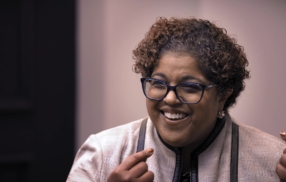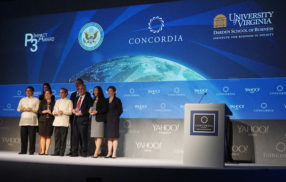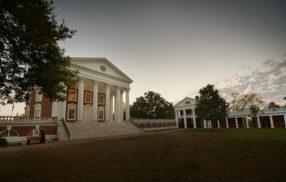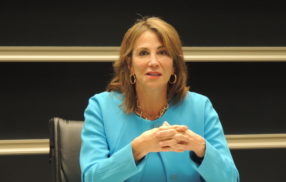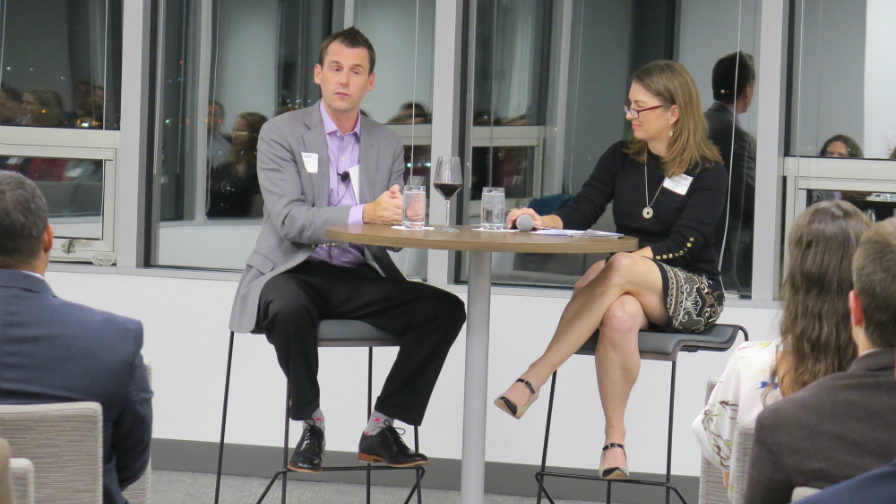
Atlantic Media President Discusses the ‘Business of Freedom of Speech’
By Laura Hennessey Martens
At the kickoff event for the recent UVA Tri-Sector Leadership Fellows program’s two-day field experience in Washington, D.C., University of Virginia Darden School of Business Professor Mary Margaret Frank led a fireside chat with Atlantic Media President Michael Finnegan (MBA ‘07), in which he discussed “the business of freedom of speech.” Finnegan addressed the importance of cross-sector and cross-disciplinary leadership perspectives within Atlantic Media’s operations and wider sociopolitical environment of the media industry.
Finnegan’s discussion and audience Q&A followed a first-ever Tri-Sector Leadership Fellows networking reception at the new UVA Darden Sands Family Grounds in the Rosslyn district of downtown Arlington, Virginia. Current Tri-Sector Leadership Fellows — students from the Darden School, the UVA Batten School of Leadership and Public Policy and UVA School of Law — had a rare opportunity to connect and network with former fellows and alumni from all three schools. The fellowship program is a cross-university effort designed to explore effective, responsible leadership and emphasize the importance of multidisciplinary perspectives in decision-making.
While discussing his current role as president of Atlantic Media, Finnegan acknowledged the forward-thinking and comprehensive approach of the fellowship program. While leading business strategy and operations, Finnegan said he also deals with a “variety of legal and policy issues as we lobby for the best interests of our industry.” While he relies on the specific skills and expertise of his legal, banking, public policy and other team members, he serves as a “utility player” through his role as president who is able to lead across all of these areas.
“Having the skillsets from all these sectors is really important,” Finnegan added. “The more you can surround yourself with a variety of experts from each of these different fields, the better off you will be.”
The Changing Media Landscape
As Frank posed a series of wide-ranging questions provided by the current student fellows, Finnegan’s responses touched on the transformation of the media industry from print to digital media, as well as the impact of social media and “fake news” on journalism.
Finnegan said the business model of media organizations has changed “dramatically” in recent years. “Ten years ago, 80% of our revenues came from print and 20% from digital sources. That has flipped, and it has totally changed the way we do business.”
Atlantic Media was an early news organization to offer all content it produced to readers for free online, an effort it undertook to get ahead of digital disruption in the market. Finnegan referred to digital media as the company’s “life raft.” For Atlantic Media, the transition has been a successful one, with the company’s estimated annual revenues at nearly $150 million.
As the discussion turned to the growing cultural conversation around “fake news” — accusations of it as well as deliberately false reporting — and its impact on the journalism industry, Finnegan pointed to Atlantic Media’s longstanding core values of editorial integrity and strong ethical rules. “Facts are facts, and we report facts,” he said.
Finnegan pointed out a surprising upside to the emergence of “fake news” within the current 24/7, “the first to report, wins” journalism environment. “Fake news has also caused many reputable news organizations to hold back and ensure the story is right and facts are straight, so as not to feed the fake news narrative,” he said.
Finnegan acknowledged that Atlantic Media, like many news organizations, has had to take extra precautions to protect their employees against violent threats. As evidence of the precarious environments in which many journalists operate, just six days after Finnegan’s talk, a series of pipe bombs were sent to the headquarters of CNN, as well as the homes and offices of several top Democratic leaders and activists.
The University of Virginia Darden School of Business prepares responsible global leaders through unparalleled transformational learning experiences. Darden’s graduate degree programs (MBA, MSBA and Ph.D.) and Executive Education & Lifelong Learning programs offered by the Darden School Foundation set the stage for a lifetime of career advancement and impact. Darden’s top-ranked faculty, renowned for teaching excellence, inspires and shapes modern business leadership worldwide through research, thought leadership and business publishing. Darden has Grounds in Charlottesville, Virginia, and the Washington, D.C., area and a global community that includes 18,000 alumni in 90 countries. Darden was established in 1955 at the University of Virginia, a top public university founded by Thomas Jefferson in 1819 in Charlottesville, Virginia.
Press Contact
Molly Mitchell
Senior Associate Director, Editorial and Media Relations
Darden School of Business
University of Virginia
MitchellM@darden.virginia.edu


